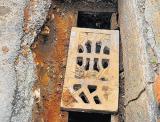You are here :
Home B'lore Rural kids eco know-how
|
Last Updated:: 12/08/2014
B'lore Rural kids eco know-how
Govt schools in B'lore Rural to give kids eco know-how
The Hindu,Bangalore, 12th August 2014
 Government schools in Bangalore Rural district will not only give children theoretical knowledge about the need to save environment but also implement the eco-friendly measures. Over 250 headmasters and headmistresses of various government schools from Bangalore Rural district attended a workshop organised by the Karnataka State Pollution Control Board here on Monday as part of the ‘eco-friendly school programme’.
Government schools in Bangalore Rural district will not only give children theoretical knowledge about the need to save environment but also implement the eco-friendly measures. Over 250 headmasters and headmistresses of various government schools from Bangalore Rural district attended a workshop organised by the Karnataka State Pollution Control Board here on Monday as part of the ‘eco-friendly school programme’.
Some headmasters said that while they had been engaging the children in certain eco-friendly activities, the workshop provided them insights into their effective implementation. Satyanarayana Gupta, headmaster at GJC High School, Doddabelavangala, said that nearly 95 per cent students refrained from bursting crackers during Deepavali last year.
Headmistress G Nagarathna, from Bashettihalli government school in Doddaballapur, said that children not only created compost from the wet waste, mainly the leftovers from mid-day meals, but also planted saplings and desilted a lake near their school.
D C Veena, headmistress at Channahalli Government High School in Devanahalli, said her students had been planting a sapling on every schoolmate’s birthday besides nurturing them. “What we need is a method for safe disposal of sanitary pads for students as they just dig a hole and dispose them there,” the headmistress added.
The eco-friendly school programme is organised under the National Green Corps under the Union Ministry of Environment and Forests. This year, the programme has been extended to all government schools in the State and for the first time headmasters were called to attend a workshop to implement the programme.
The headmasters were asked to fill a questionnaire on how water is handled in their respective schools, what kind of fuel is used to cook midday meals, what kind of soil is used to grow plants, how many bulbs/tubelights are used in the school, etc.
There were also questions on cleanliness and hygiene and details about nature expeditions.
Each school gets Rs 2,500 from the ministry for such purpose.